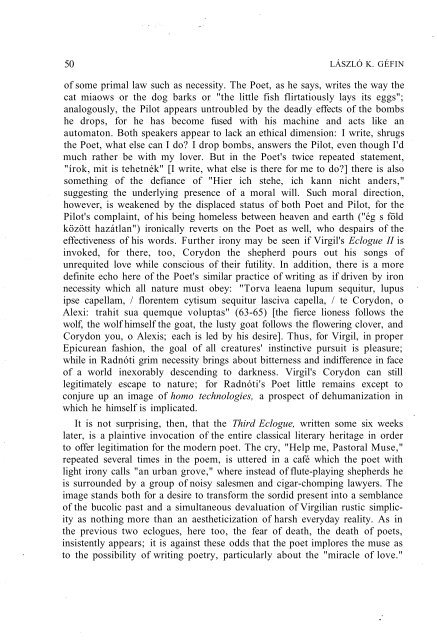50 LÁSZLÓ K. GÉFI<strong>No</strong>f some primal law such as necessity. The Poet, as he says, writes the way thecat miaows or the dog barks or "the little fish flirtatiously lays its eggs";analogously, the Pilot appears untroubled by the deadly effects of the bombshe drops, for he has become fused with his machine and acts like anautomaton. Both speakers appear to lack an ethical dimension: I write, shrugsthe Poet, what else can I do? I drop bombs, answers the Pilot, even though I'dmuch rather be with my lover. But in the Poet's twice repeated statement,"írok, mit is tehetnék" [I write, what else is there for me to do?] there is alsosomething of the defiance of "Hier ich stehe, ich kann nicht anders,"suggesting the underlying presence of a moral will. Such moral direction,however, is weakened by the displaced status of both Poet and Pilot, for thePilot's complaint, of his being homeless between heaven and earth ("ég s földközött hazátlan") ironically reverts on the Poet as well, who despairs of theeffectiveness of his words. Further irony may be seen if Virgil's Eclogue II isinvoked, for there, too, Corydon the shepherd pours out his songs ofunrequited love while conscious of their futility. In addition, there is a moredefinite echo here of the Poet's similar practice of writing as if driven by ironnecessity which all nature must obey: "Torva leaena lupum sequitur, lupusipse capellam, / florentem cytisum sequitur lasciva capella, / te Corydon, oAlexi: trahit sua quemque voluptas" (63-65) [the fierce lioness follows thewolf, the wolf himself the goat, the lusty goat follows the flowering clover, andCorydon you, o Alexis; each is led by his desire]. Thus, for Virgil, in properEpicurean fashion, the goal of all creatures' instinctive pursuit is pleasure;while in Radnóti grim necessity brings about bitterness and indifference in faceof a world inexorably descending to darkness. Virgil's Corydon can stilllegitimately escape to nature; for Radnóti's Poet little remains except toconjure up an image of homo technologies, a prospect of dehumanization inwhich he himself is implicated.It is not surprising, then, that the Third Eclogue, written some six weekslater, is a plaintive invocation of the entire classical literary heritage in orderto offer legitimation for the modern poet. The cry, "Help me, Pastoral Muse,"repeated several times in the poem, is uttered in a café which the poet withlight irony calls "an urban grove," where instead of flute-playing shepherds heis surrounded by a group of noisy salesmen and cigar-chomping lawyers. Theimage stands both for a desire to transform the sordid present into a semblanceof the bucolic past and a simultaneous devaluation of Virgilian rustic simplicityas nothing more than an aestheticization of harsh everyday reality. As inthe previous two eclogues, here too, the fear of death, the death of poets,insistently appears; it is against these odds that the poet implores the muse asto the possibility of writing poetry, particularly about the "miracle of love."
HELP ME, PASTORAL MUSE 51Once again the prophetic note is struck: "Űgy halnak e korban a költők... /csak ránkomlik az ég, nem jelzi halom porainkat, / sem nemesívű szép, görögurna nem őrzi, de egy-két / versünk hogyha marad..." [How the poets of thisage are dying away... The sky falls in on us, no mound is raised above ourashes, no noble Grecian urn will gracefully hold them, only a few poemsremain as if by chance]. The "Grecian urn" nostalgically alludes both to Keats'ode and to Donne's "well-wrought urn," emblems of happier ages when poetryhad value and meaning.Thus, the invocation to the Pastoral Muse, which is borrowed from Virgil'sEclogue IV (appearing also in Eclogue VIII ), is at once more desperate andimplicitly critical of the relative ease with which Virgil can prophesy the returnof the golden age. Eclogue IV predicts the birth of a child who will bring aboutthis new age, "quo ferrae primum / desinet ac totó sürget gens aurea mundo"(8-9) [under whom the iron brood shall first cease, and a golden race shallspring up across the world]. In sardonic contrast to this marvellous childstands the image of the child in Radnóti's own Fourth Eclogue, taken from hisautobiography. Instead of peace, this child brought death into the world,killing (or so Radnóti assumed) both the mother and his twin brother, apsychological burden that weighed heavily on Radnóti throughout his life. Yetthe autobiographical reference is further qualified by the deliberate allusion tothat other child who comes to establish a golden era: "És megszületni újra újvilágra, / mikor arany gőzök közül vakít / s új hajnalokra kél a nap világa"[And to be reborn into a new world, when the sunlight blindingly shootsthrough golden vapours and rises to a new dawn]. Again, Virgil's wishfulthinking combined with a flattery of Pollio or Octavian is displaced onto theplane of history, evoking the possibility of a more just world after the end ofthe present war. With the line "Az írótáblák összetörtek" [the writing slateshave been shattered] Radnóti continues the topos of the demise of poetry,while paradoxically continuing to write it; there is also an echo of the despairof the dispossessed Meliboeus in Virgil's Eclogue I and his mournful notespoken to the self-satisfied Tityrus, "carmina nulla canam" [I shall not singsongs anymore]. Similarly the plea of the displaced poet, "Segíts szabadság, /ó hadd leljem meg végre honnomat" [Help me, Freedom, o let me find myhomeland at last] voices a desire to put an end to the Poet's alienation andcome in from the cold, as it were. Yet an intertextual hint, coming from oneof Attila József s last poems, "íme hát megleltem hazámat" (József II, 419) [Ihave finally found my homeland], lends the line a wholly different resonance,one that is bereft of any hope. Such a reading is further corroborated by theundoing of any optimistic closure the Voice, the Poet's interlocutor in theFourth Eclogue, would like to impress on the poem. His highflown suggestion
- Page 1 and 2: Papers of the Radnóti Memorial Con
- Page 3: HUNGARIAN STUDIESVOLUME 11, 1996 CO
- Page 8 and 9: 6 GEORGE GÖMÖRIprobably Fürst an
- Page 10 and 11: 8 GEORGE GÖMÖRIof the utmost impo
- Page 12 and 13: 10 GEORGE GÖMÖRIén e földön...
- Page 14 and 15: 12 GEORGE GÖMÖRINotes1. Miklós R
- Page 16 and 17: 14 MIHÁLY SZEGEDY-MASZÁKself alwa
- Page 18 and 19: 16 MIHÁLY SZEGEDY-MASZÁKtype is r
- Page 20 and 21: 18 MIHÁLY SZEGEDY-MASZÁKpose, the
- Page 22 and 23: 20 MIHÁLY SZEGEDY-MASZÁK"Wozu Dic
- Page 24 and 25: 22 MIHÁLY SZEGEDY-MASZÁKand Wilme
- Page 26 and 27: 24 MIHÁLY SZEGEDY-MASZÁKbeen the
- Page 28 and 29: 26 MIHÁLY SZEGEDY-MASZÁKBolond, k
- Page 30 and 31: 28 MIHÁLY SZEGEDY-MASZÁK6. Emery
- Page 32 and 33: 30 ZSUZSANNA OZSVÁTHand breaks as
- Page 34 and 35: 32 ZSUZSANNA OZSVÁTHThe drama echo
- Page 36: 34 ZSUZSANNA OZSVÁTHcontinents at
- Page 39 and 40: FROM CAIN TO NAHUM 37which, as Csap
- Page 41 and 42: \FROM CAIN TO NAHUM 39and bears and
- Page 43 and 44: FROM CAIN TO NAHUM 41who sees what
- Page 45 and 46: FROM CAIN TO NAHUM 438. "A félelme
- Page 47 and 48: HELP ME, PASTORAL MUSE:THE VIRGELIA
- Page 49 and 50: HELP ME, PASTORAL MUSE 47compete! W
- Page 51: HELP ME, PASTORAL MUSE 49of a priva
- Page 55 and 56: HELP ME, PASTORAL MUSE 53Eighth Ecl
- Page 57 and 58: HELP ME, PASTORAL MUSE 55have that
- Page 59: HELP ME, PASTORAL MUSE 57Paul de Ma
- Page 62 and 63: 60 SAMUEL J. WILSONWe did, however,
- Page 64 and 65: 62 SAMUEL J. WILSONbeings and contr
- Page 66 and 67: 64 SAMUEL J. WILSONHungarians would
- Page 68 and 69: 66 SAMUEL J. WILSONthe Austrians. G
- Page 70 and 71: 68 SAMUEL J. WILSONnorth-eastern Zi
- Page 72 and 73: 70 SAMUEL J. WILSONoriginally pursu
- Page 74 and 75: 72 SAMUEL J. WILSONGörgey's decisi
- Page 76 and 77: 74 SAMUEL J. WILSONfrom occurring,
- Page 78 and 79: 76 SAMUEL J. WILSON8. Artúr Görge
- Page 80 and 81: 78 STEVEN TÖTÖSY de ZEPETNEKtört
- Page 82 and 83: 80 STEVEN TÖTÖSY de ZEPETNEKThe c
- Page 84 and 85: 82 STEVEN TÖTÖSY de ZEPETNEKher u
- Page 86 and 87: 84 STEVEN TÖTÖSY de ZEPETNEKthe b
- Page 88 and 89: 86 STEVEN TÖTÖSY de ZEPETNEKrooti
- Page 90 and 91: 88 STEVEN TÖTÖSY de ZEPETNEKcriti
- Page 92 and 93: 90 STEVEN TÖTÖSY de ZEPETNEK'My f
- Page 94 and 95: 92 STEVEN TÖTÖSY de ZEPETNEKshe d
- Page 96 and 97: 94 STEVEN TÖTÖSY de ZEPETNEKNotes
- Page 99 and 100: BERLIN ET PARIS DE LAJOS TIHANYIVAL
- Page 101 and 102: BERLIN ET PARIS DE LAJOS TIHANYI 99
- Page 103 and 104:
BERLIN ET PARIS DE LAJOS TIHANYI 10
- Page 105 and 106:
BERLIN ET PARIS DE LAJOS TIHANYI 10
- Page 107 and 108:
BERLIN ET PARIS DE LAJOS TIHANYI 10
- Page 109 and 110:
BERLIN ET PARIS DE LAJOS TIHANYI 10
- Page 111 and 112:
BERLIN ET PARIS DE LAJOS TIHANYI 10
- Page 113 and 114:
BERLIN ET PARIS DE LAJOS TIHANYI 11
- Page 115:
BERLIN ET PARIS DE LAJOS TIHANYI 11
- Page 118 and 119:
116 KEVIN E. KELLYfilms Lugosi made
- Page 120 and 121:
118 KEVIN E. KELLYthe provinces, no
- Page 122 and 123:
120 KEVIN E. KELLYWith his brief an
- Page 124 and 125:
122 KEVIN E. KELLYboth his and Dean
- Page 126 and 127:
124 KEVIN E. KELLYfollowed it into
- Page 128 and 129:
126 KEVIN E. KELLYvampiric nobleman
- Page 130 and 131:
128 KEVIN E. KELLYThe film also boo
- Page 132 and 133:
130 KEVIN E. KELLYWood remained one
- Page 134 and 135:
132 KEVIN E. KELLYLugosi, convinced
- Page 136 and 137:
134 KEVIN E. KELLY19. Lennig, 112-1
- Page 139 and 140:
THE AGON OF IRONY AND SATIREIN GYÖ
- Page 141 and 142:
THE AGON OF IRONY AND SATIRE 139poe
- Page 143 and 144:
THE AGON OF IRONY AND SATIRE 141tra
- Page 145 and 146:
THE AGON OF IRONY AND SATIRE 143fek
- Page 147 and 148:
THE AGON OF IRONY AND SATIRE 145ner
- Page 149 and 150:
THE AGON OF IRONY AND SATIRE 147whi
- Page 151 and 152:
THE AGON OF IRONY AND SATIRE 149mov
- Page 153 and 154:
THE AGON OF IRONY AND SATIRE 151for
- Page 155 and 156:
THE AGON OF IRONY AND SATIREA harma
- Page 157 and 158:
MURDER IN THE MOUNTAINSTranslated b
- Page 159 and 160:
MURDER IN THE MOUNTAINS 157"Afraid?
- Page 161 and 162:
MURDER IN THE MOUNTAINS 159Abády,
- Page 163 and 164:
MURDER IN THE MOUNTAINS 161"The mar
- Page 165 and 166:
MURDER IN THE MOUNTAINS 163Bálint
- Page 167 and 168:
MURDER IN THE MOUNTAINS 165"That is
- Page 169 and 170:
MURDER IN THE MOUNTAINS 167at hand,
- Page 171 and 172:
CONTRIBUTORSMiklós BÁNFFYLászló
















